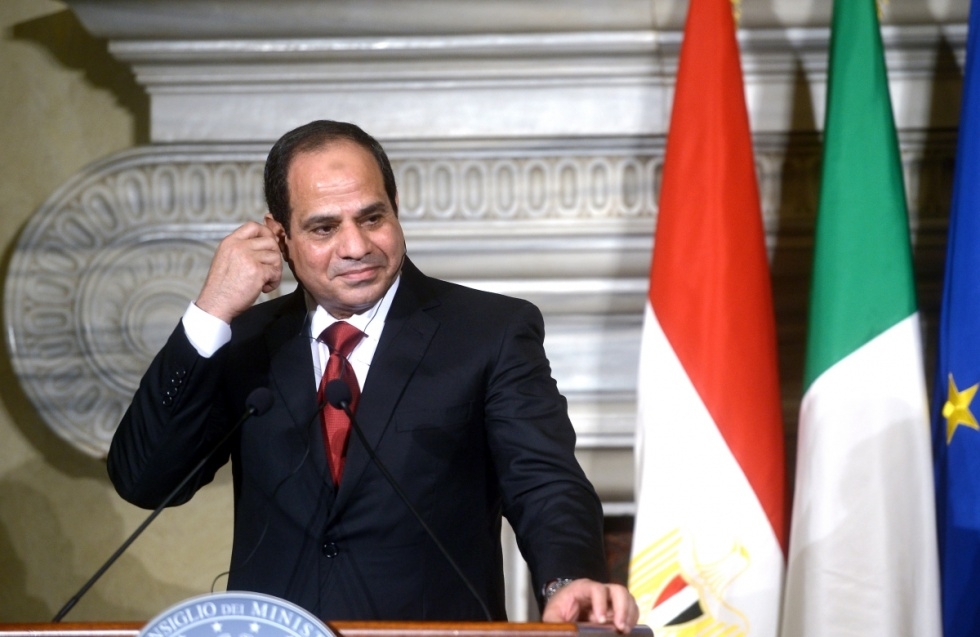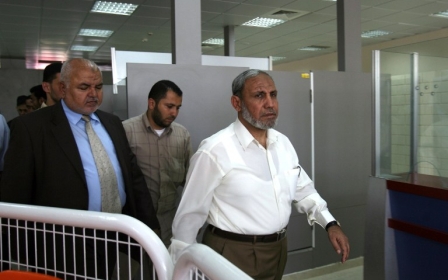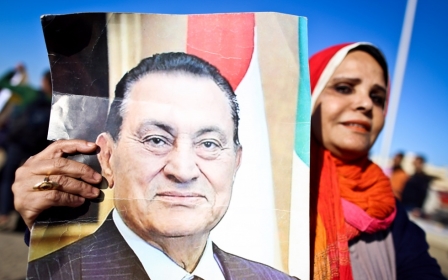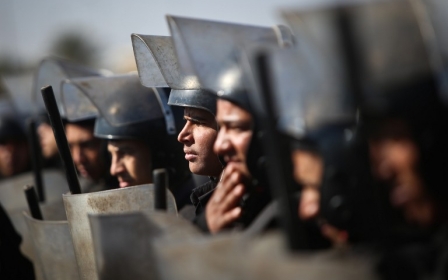Egypt's Sisi 'will not comment' on Mubarak ruling

Egyptian President Abdel-Fattah al-Sisi refused to comment on Sunday on a Cairo court's decision to drop charges against former President Hosni Mubarak for allegedly inciting the killing of demonstrators during the 2011 uprising.
"In accordance with the Egyptian constitution, which has granted full independence to the judiciary, the [presidency] will not comment on legal verdicts issued by courts," the presidency said in a statement.
"Egypt will not go backward after two revolutions," the statement quoted al-Sisi as saying in his first reaction to the court ruling.
On Saturday, a criminal court dropped charges against Mubarak, his interior minister and several officials that had been accused of conspiring to kill protesters during the 2011 revolution that brought Mubarak's near 30-year rule to an end.
The presidency said in the statement that al-Sisi had ordered the cabinet to reconsider Egypt's Criminal Law, a move recommended by the Mubarak trial judge on Saturday.
"The President also ordered the cabinet to reconsider compensation for the families of the dead victims of the revolution and its injured victims," the presidency said.
Earlier on Sunday, al-Sisi met with Justice Minister Mahfouz Saber and Transitional Justice Minister Ibrahim al-Heneidi to discuss proposed amendments to the Criminal Law, presidential spokesman Alaa Youssef said.
The ruling triggered protests in Cairo on Saturday evening. An estimated 2,000 people gathered close to the iconic Tahrir Square, chanting against Mubarak and “military rule”. Security forces responded with water cannon, teargas and live fire, and at least two protesters were killed and many others injured.
On Sunday students across the country rallied against Mubarak, with clashes reported at several universities, including Zagazig University northeast of Cairo.
Students Against the Coup (SAC) posted videos of students chanting at Cairo University.
Mubarak and his interior minister were sentenced to 25 years in prison in late 2012 for ordering the murder of demonstrators during the 2011 uprising.
The court later, however, ordered a retrial after the former president's lawyers successfully appealed the sentence.
Saturday's verdict is still subject to appeal.
Rights groups have decried the decision to drop murder charges against Mubarak and his former officials.
"The verdict further reinforces concerns about the alarmingly selective justice system in Egypt, which appears more intent on settling political scores and punishing dissent than establishing justice," said the Egyptian Initiative for Personal Rights (EIPR), a leading rights group.
In July last year, current president Sisi, then head of the army, ousted Muslim Brotherhood leader Mohammed Morsi from the presidency in a popularly-backed military coup. Since then, there has been a widespread crackdown on government critics, which has seen tens of thousands put in prison and laws passed labelling the Muslim Brotherhood a terror group.
Experts said the judiciary, which includes many judges hostile to the Muslim Brotherhood, has become one of the government's main instruments of quashing dissent. A court on Wednesday sentenced 78 teenage boys to between two and five years in prison for joining Muslim Brotherhood rallies demanding Morsi's return.
"All of this proves that the justice system is in need of reform," human rights lawyer Gamal Eid said.
On Sunday 21 Islamists were sentenced to three years in prison for chanting during a court session. They, along with deposed president Morsi, have been charged with alleged violence during the 2011 revolution.
Despite the far reaching crackdown on dissent, some Egypt-based analysts said the people are “tired” after nearly four years of unrest and want stability.
"The subject (of Mubarak's verdict) doesn't worry them, what they want is the stability that the current regime can offer," said Ashraf el-Sherif, a political analyst at the American University in Cairo.
However, activist groups remained steadfast in their opposition to Sisi and said Saturday’s court ruling had exposed the reality of the current government.
"This verdict confirms that Mr Sisi is part of Mr Mubarak's regime," said Amr Ali, a leader of the April 6 movement that spearheaded the 2011 revolution but was earlier this year banned by the government.
Ali said the ruling sent out a clear message to activists like himself: "Your dream is over and there is nothing you can do about it because the tanks are everywhere and the military controls the country."
New MEE newsletter: Jerusalem Dispatch
Sign up to get the latest insights and analysis on Israel-Palestine, alongside Turkey Unpacked and other MEE newsletters
Middle East Eye delivers independent and unrivalled coverage and analysis of the Middle East, North Africa and beyond. To learn more about republishing this content and the associated fees, please fill out this form. More about MEE can be found here.




